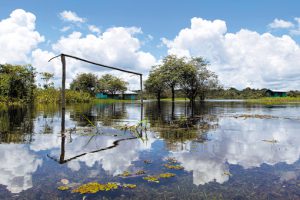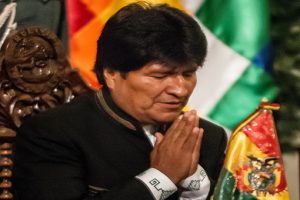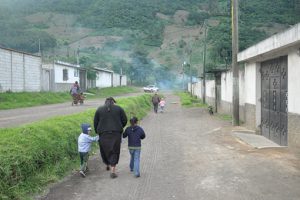Costa Rica to Invest $100 Million to Modernize Border Crossings
The Inter-American Development Bank (IDB) approved $100 million dollars for Costa Rica to modernize its border-crossing infrastructure, the Ministry of Finance announced on Tuesday. The plan seeks to bolster trade competitiveness at Costa Rica’s four border crossings with Nicaragua and Panama. In late 2014, Nicaragua completed the construction of a bridge at the Las Tablillas … Read more
Re-Thinking the OAS: A Forum
Growing regional divisions between—but not limited to—the north and the rest of the hemisphere and the emergence of new regional organizations have focused attention on the role and purpose of the 66-year-old Organization of American States (OAS). This discussion comes as the 10-year term of the much-criticized Secretary General José Miguel Insulza draws to an … Read more

A Dash of Color: Latin America’s Color Runs
Chalk it up to the running craze in Latin America. Or to the revitalization of the region’s cities. Either way, the U.S.-based Color Run is turning the hemisphere’s streets into a rainbow of vibrant color. The urban running events—which are billed as “the happiest 5K on the planet”—involve a 3.1-mile sprint through a city while … Read more

Latin America and UN Climate Talks: Not in Harmony
When it comes to climate change, Latin American citizens and their leaders get the big picture. According to surveys, the region’s citizens are very worried about global warming, and its leaders frequently cite climate change as a major national security threat at United Nations conferences. However, the consensus appears to largely end there. National positions … Read more
Is 2015 the Year for India in Latin America?
All eyes have been on U.S. President Barack Obama’s recent state visit to India, where he and Indian Prime Minister Narendra Modi met amidst the excitement and pageantry of the country’s annual Republic Day. The two, who have met twice since Modi’s arrival in office in May of last year, announced a deal on civilian … Read more
New Study Ranks Democracy in Latin America
Only two countries in Latin America—Costa Rica and Uruguay—can be considered “full democracies,” according to an Economist Intelligence Unit (EIU) study commissioned by BBC for Democracy Day on January 20. The report says that a majority of Latin American countries hold “free and fair” elections and are better ranked than their counterparts in the Middle … Read more

Cuba-U.S. Normalization: Continuous Coverage from Americas Quarterly
Photo courtesy of Flickr user Doug Wheller. On December 17, Cuba released 65-year-old former U.S. Agency for International Development (USAID) contractor Alan Gross from prison on humanitarian grounds, paving the way for normalized relations between the U.S. and Cuba. Immediately thereafter, U.S. President Barack Obama announced that the U.S. and Cuba will re-establish diplomatic relations—and … Read more

Incumbents Aren’t Latin America’s Problem
It’s been an exceptionally good year for incumbents in Latin America. Since June, Colombia’s Juan Manuel Santos, Bolivia’s Evo Morales and Brazil’s Dilma Rousseff each won their respective presidential contests. Rousseff’s late October re-election will give her center-left Partido dos Trabalhadores (Workers’ Party—PT) a fourth consecutive term in office. As it turns out, it’s been an exceptionally … Read more

The Electoral Challenge for the Western Hemisphere
After more than three decades of experience with representative democracy, most Latin American countries have successfully reduced ballot-stuffing and other forms of election-day fraud, only to be faced with a different challenge: ensuring that elections are truly competitive. The legacy of concentrating power in iconic personalities or political parties gives incumbents around the region an … Read more

Cuba and the Summits of the Americas
In the coming months, the United States is going to face a tough choice: either alter its policy toward Cuba or face the virtual collapse of its diplomacy in Latin America. The upcoming Summit of the Americas, the seventh meeting of democratically elected heads of state throughout the Americas, due to convene in April 2015 … Read more
Dilma Redux?
The re-election of President Dilma Rousseff as president of Brazil was not a foregone conclusion as little as a week ago. While the campaign could not have been dirtier, with charges of corruption, womanizing and wife-beating flying around, Rousseff’s Partido dos Trabalhadores (Workers’ Party—PT) now seems set for another four years in office. The PT … Read more
Mesoamerica’s Infrastructure Projects and Reducing Climate Change
This week, New York City hosted the Climate Summit 2014, an event aimed at shaping the world’s future developmental policies. Just one month earlier in Nicaragua, delegates from the Mesoamerican region met to analyze the social, environmental and economic impacts of severe droughts this year. Proyecto Mesoamérica (Mesoamerican Project), launched in 2008 by heads … Read more
These Are a Few of My Favorite [AP] Words
If there are two things that inspire me it’s a ramped up, over-the-top, scurrilous AP story about democracy promotion and a Broadway musical–especially a Rodgers and Hammerstein production. So, here is my adaptation of the classic Sound of Music, “My Favorite Things,” based on the recent series of articles published by AP on USAID’s democracy … Read more
Cuba and the Summits of the Americas
If the U.S. wants to keep the Summit of the Americas process on track and regain some measure of influence in the hemisphere, it will have to change its Cuba policy, pronto. Reframing our policy and saving the Summit process isn’t as tough as it seems; it just takes leadership. In coming months, the United … Read more

Beyond the Blame Game: Visualizing the Complexity of the Border Crisis
Much has been written and discussed in the last month about the causes of the migration of thousands of undocumented minors and women with young children from Central America’s Northern Triangle region (Guatemala, El Salvador and Honduras) to the United States.[1] The debate has ranged from analyzing the so-called “pull factors” in the U.S. to … Read more


